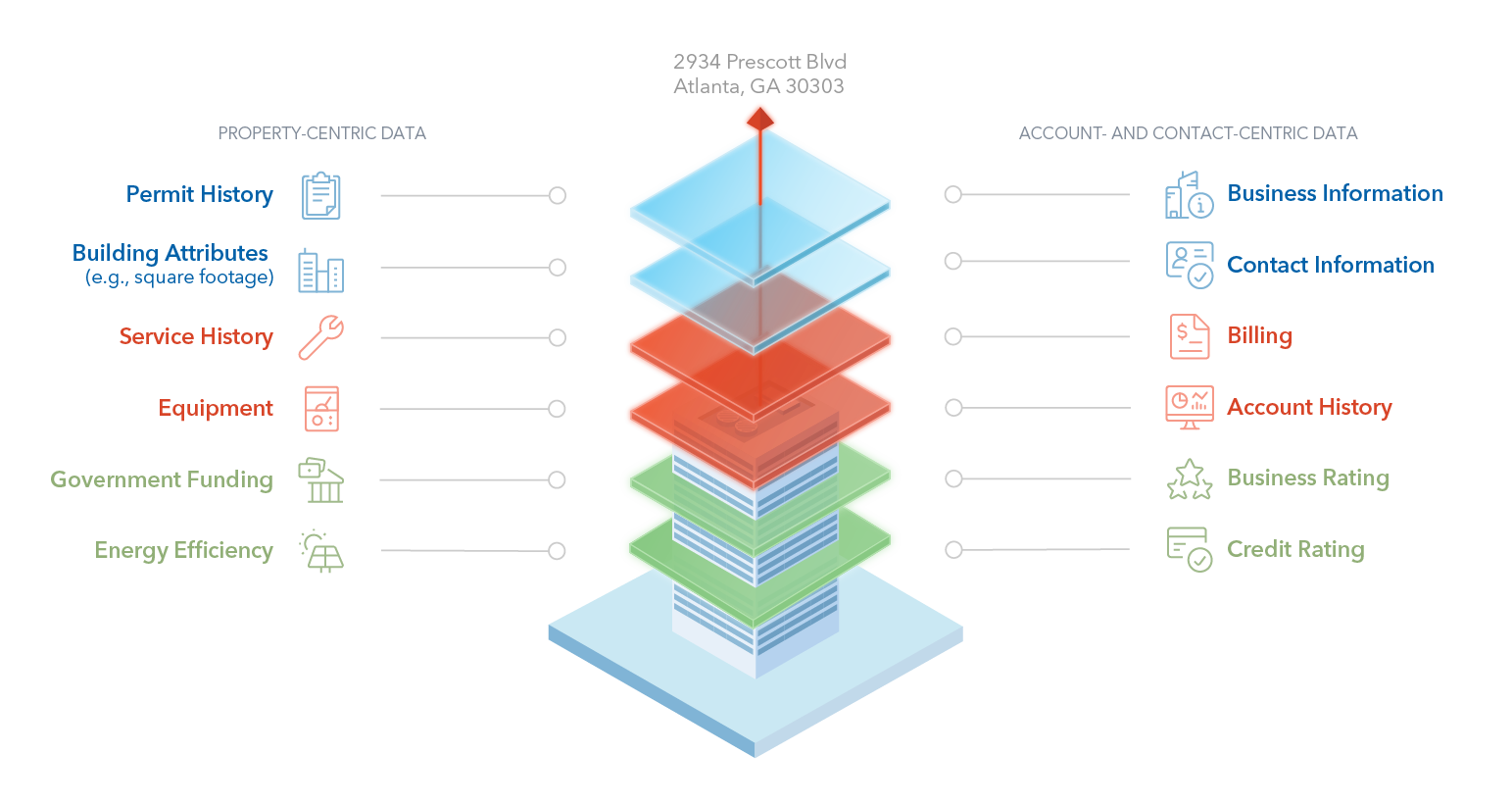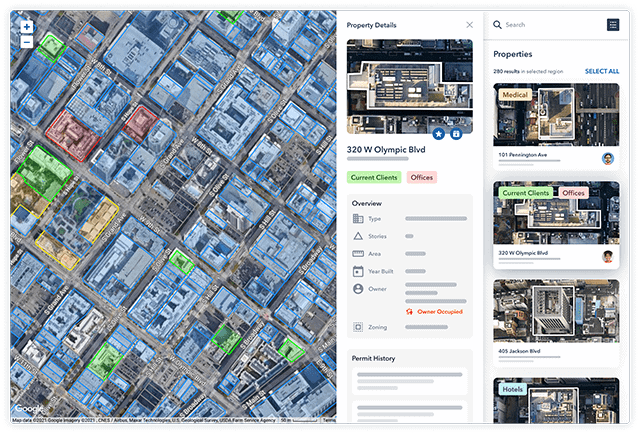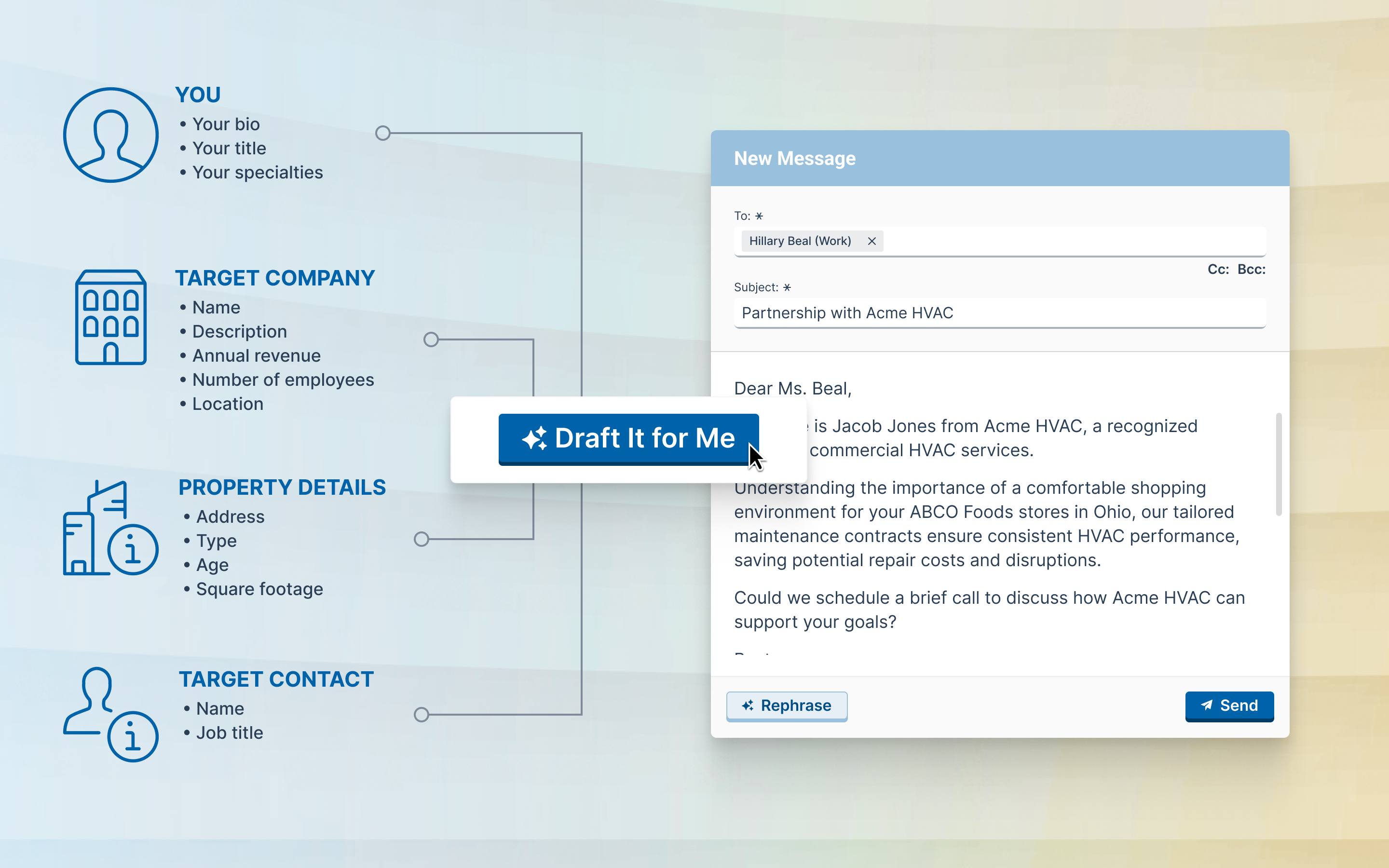Introduction
In the highly competitive world of commercial services sales, data is king. It’s the key to unlocking new opportunities and driving business growth.
Property data, in particular, holds immense value to anyone selling into commercial properties and prospecting property owners and managers. It provides vital insights into the building, a potential customer’s needs, and the decision-makers, helping sales reps make informed decisions on who to contact and what to say.
But how can commercial services businesses—HVAC, landscaping and grounds, roofing and solar, and cleaning and janitorial take advantage of this data? How can they use it to win new deals, accelerate sales, and boost their return on investment (ROI)?
In this article, we’ll answer these questions. We’ll discuss the importance of property data, its role in lead generation, and its impact on your sales cycle.
We’ll also explore how to craft personalized sales messages using both property data and intent data. By the end, you’ll have a clear understanding of the ROI of property data and how to use it to your advantage.
Understanding Property Data and Its Importance

“Property data” is a category of data that encompasses a wide array of information. It includes ownership records, tenant records, permit histories, zoning details, and more.
Commercial services rely on this data for insight into potential sales opportunities. When regularly updated, property data helps sales reps identify which prospects to target and even make informed decisions on when to reach out to them. In this way, a data-driven approach can improve the efficiency and competitiveness of your business’s sales operations.
But leveraging these key insights isn’t easy- first off, what data is available, and where do you even find it?
Types of Property Data for Commercial Services

In commercial real estate, various types of property data are key for different job titles. For lenders and bankers, comps and valuation data will be central to their role. For sales reps at building products and commercial services companies, ownership and management details, square footage, tenant data, and permit history will be vital.
Some key types of property data include:
Ownership Records: Details about current and past owners.
Decision-maker contact details: Job titles, email addresses, and phone numbers for key personnel.
Transaction History: Records of buying and selling activities.
Zoning Information: Regulations about land use and property development.
Tenant Data: Details about the current and past tenants of a building.
Permit History: Information on construction permits granted for the property.
Building Attributes: (e.g., square footage, equipment, and service history.)
Demographic Data: Insights into the population around the property.
Geospatial Data: Location-based details for mapping and analysis.
Aerial Imagery: High-resolution views of properties to assess physical features and potential issues.
Having access to this data gives commercial services sales reps a competitive advantage. With the right property data, they can tailor their pitches and target their efforts effectively, leading to higher conversions and increased ROI.
Leveraging Property Data for Effective Lead Generation

Property data is key to generating quality leads for your commercial services business. Using the right data, you can easily find prospects who are a perfect fit for your services. This targeted approach means better conversion rates and more deals closed.
Property data analysis can open up new opportunities in new markets. It allows service providers to focus on where they will succeed most. This targeted approach saves time and money and increases ROI.
Plus, when your sales reps see their entire territory on a map and all of the opportunities are pinpointed, it makes finding and closing deals much easier.
Crafting Personalized Sales Messages with Property Insights

However, having the data and seeing the opportunities isn’t enough to increase revenue; you also have to use it in your messaging. “Personalization” has been the core driver of effective cold outreach for years, and it’s no different today. Tailoring your sales messages to individual property owners and managers cuts through the noise and gets their attention, whereas generic sales messaging gets sent to “junk.”
Property data gives you the insight to do that. In property intelligence tools like Convex, there’s a feature called Signals. Signals were built on what’s known as “intent data” to help you identify accounts that are actively looking for your services.
This is more than just knowing the ownership history and property type; Signals gathers factors like search intent, website interactions, data from cookies, and other sources to help you send the right message to the right person at the right time.
When your sales messages resonate with property owners, the response rate goes up. Intent data helps you understand owner needs so that your messaging is on point. This personal approach can increase lead conversion and deal success.
Using property data also helps you highlight competitive advantage to potential clients. By showing if the property is currently a competitor’s customer, you can identify upselling and cross-selling opportunities that you may have missed.
According to LinkedIn and Iterable, personalized outreach messaging has open rates that are more than 50% higher than generic messages. Imagine doubling the number of leads that responded just by changing a few relevant words.
The Impact of Property Data on Sales Cycles and Closure Rates

When you’re sending a cold outreach email or making a call, speed and accuracy are key. If you have the wrong data, you’ll send messaging that’s not relevant, and your prospects won’t respond positively. If you’re too slow, a competitor will swoop in and steal the potential customer from under your nose.
Property data streamlines the initial phase of the sales process—prospecting, lead generation, and outreach—by providing early insights, often ahead of the competition. This advantage allows your team to act first.
In essence, property data enables you to identify qualified leads, reducing time spent on unproductive pursuits. By concentrating on the most promising opportunities, sales teams can operate more efficiently and achieve superior results.
According to one customer, using property data lowered sales onboarding times by 60%+ and decreased the amount of time to fill the sales pipeline from 2-3 days per week to 2- 3 hours per week (more in the next section).
Case Studies: Success Stories of Property Data in Action

Comfort Systems USA Southwest faced a challenge when they found Convex four years ago: How to capture more business efficiently across Arizona and New Mexico.
Traditional prospecting methods, like searching LinkedIn or driving around to find leads, often took hours and yielded mixed results.
With $100 billion in potential install base to pursue, Southwest Division President Craig Little recognized they needed a better way to focus on high-value prospects.
Streamlined Prospecting with Property Intelligence
Atlas allowed Comfort Systems to quickly target properties based on factors like building size and ownership status. This targeted approach helped their sales consultants spend just a few hours a week identifying leads and engaging decision-makers with personalized, data-backed insights.
“Now, I know exactly who to go after,” shared Joel Martos, a Sales Consultant at Comfort Systems USA Southwest.
Doubling Sales
Since adopting Convex, Comfort Systems has more than doubled in sales, with Atlas at the core of its prospecting. By helping them pinpoint qualified leads and save time, Atlas became an essential part of their strategy. As Sales Director Brian Ruffner noted, “Atlas has become the centerpiece of all of our prospecting efforts.”
This real-world example shows how sales efficiency tools like Convex allow companies to scale faster and reach high-potential clients with ease.
Integrating Property Data with CRM for Enhanced Lead Management

Merging property data with your Customer Relationship Management (CRM) system supercharges lead management. It puts all the key data at your team’s fingertips. This integration means more informed and efficient interactions with prospects.
A CRM “enriched” with property data means more targeted and personal outreach. Sales teams can tailor their communication based on updated owner records and transaction history. More chance of converting prospects into clients and higher success rates.
Plus, this integration organizes data and facilitates real-time collaboration across departments. It reduces admin time. So commercial teams can focus on relationship building and closing deals, more ROI.
Measuring the Effectiveness and ROI of Property Data for Lead Generation

Notebooks, calculator, pens, cactus on wooden desks and loft walls with sunlight and copy space
For commercial services companies, property data isn’t just a tool—it’s a competitive advantage.
But how do you measure its effectiveness and ensure it’s delivering real value to your business?
Focusing on metrics like lead conversion rates, sales velocity, and pipeline growth can give you a clear picture of how well property data is driving results.
Key Metrics to Track
1. Lead Conversion Rates: How many prospects identified through property data convert into qualified leads or paying customers? This metric shows whether you’re targeting the right opportunities.
2. Sales Cycle Length: Using property data often speeds up the sales process by giving reps direct access to decision-makers. Tracking how much faster deals close can quantify its impact.
3. Revenue from Data-Driven Leads: Measure how much revenue comes from deals sourced or influenced by property data insights. This connects property data directly to your bottom line.
Conclusion: Turning Property Data into a Winning Strategy for Commercial Services

Property data isn’t just a resource; it’s a game-changer for commercial services companies looking to stay ahead in a competitive market. By using detailed insights about properties, ownership, and intent, you can shift from reactive prospecting to proactive selling. Property data empowers your sales team to pinpoint opportunities, craft tailored messages, and connect with decision-makers faster—ultimately improving lead quality, closing rates, and ROI.
From shortening sales cycles to uncovering hidden opportunities, the value of property data goes beyond the numbers. It enables your team to spend less time searching and more time engaging with the right prospects at the right time, setting the stage for sustainable growth.
If you’re ready to stop chasing leads and start closing deals with confidence, Schedule a free demo of Convex today! Our team would love to share how property data can drive big wins for your commercial services business.
Share





